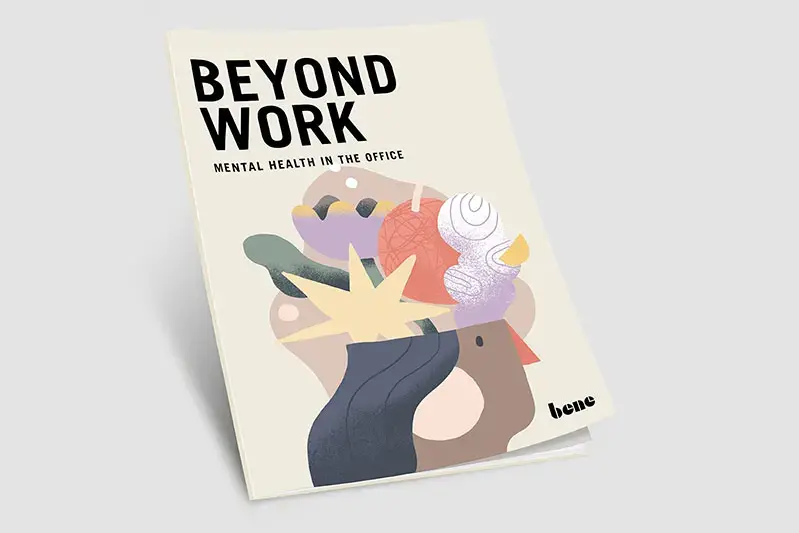Wellbeing at the Office:
The Role of Workspace Design in Mental Health and Performance
Vienna, 15.10.2025 – Noise, a lack of retreat options, and impersonal open-plan offices take their toll on many employees. A recent Bene study demonstrates the impact of the work environment on wellbeing and performance – and why intelligent workspace design is becoming a key factor for health and mental balance. The findings are summarized in the new White Paper “Beyond Work – Mental Health in the Office.”
The study, conducted by the team led by Prof. Dr. Bernd Wegener (Humboldt University Berlin), focused on two aspects: the effects of the work environment on employees’ mental health, and their satisfaction with the office’s spatial characteristics. Around 1,000 office employees in Germany and Austria were surveyed in an online panel. They were asked which tasks shape a typical workday, whether the appropriate spatial offerings are available, and what role factors such as light, acoustics, or social interaction play.
Noise Exposure as the Main Issue
Independent desk work remains the most common activity, well ahead of meetings, video calls, or teamwork. This has a direct impact on the survey results: although over 80% of respondents find the available space satisfactory and around 60% rate their work environment positively, only 17% say they have enough quiet to work in a focused and efficient way. About one-third often feel stressed and tense at the office. The problem is especially widespread in traditional open-plan offices, where high noise levels and poor soundproofing cause distractions. Unsurprisingly, such offices score significantly worse than smaller or more differentiated workplaces.
A Critical View of “Desk Sharing”
Flexible “desk-sharing” models, where workstations are reassigned daily, also come under scrutiny. For many office workers, a personal desk is a place of autonomy. At the same time, employers must respond to hybrid work situations – for example, when more home office use leaves desks empty and unused space increases costs. However, the shift toward more dynamic working styles in open offices is not categorically rejected by respondents. Even large, open spaces can foster wellbeing and satisfaction – provided they are intelligently designed.
The Need for Intelligent Workspace Design
What matters most is the design beyond individual workstations: retreat areas, spaces for communication, and break zones. Dedicated areas for focused individual work also play an important role, often acting as buffer zones. Where such offerings exist, key comfort parameters improve – including acoustics, lighting, room temperature, and technical equipment. The findings therefore do not suggest avoiding open-plan offices altogether or rolling back flexible workspace models. Rather, the goal is to use intelligent workspace design to counter the drawbacks of conventional office layouts.
Raising Awareness
“Mental health is a key prerequisite for performance, creativity, and satisfaction in everyday work,” says Michael Fried, Managing Director at Bene. “With this White Paper, we want to better understand which factors exert decisive influence and what can be done about them. The aim is to raise greater awareness of the issue and encourage companies to take appropriate measures.”
The White Paper “Beyond Work: Mental Health in the Office” provides a detailed look at the study’s findings: alongside in-depth analysis, it highlights fields of action for companies and offers concrete inspiration for designing work environments that actively promote employee wellbeing.
bene.com/en/concepts-knowledge/beyond-work
Illustrations: © Wald und Schwert



